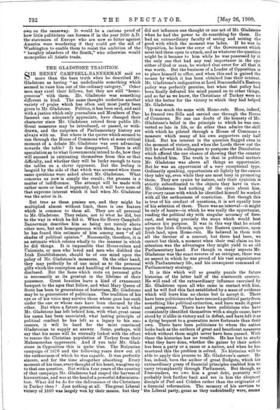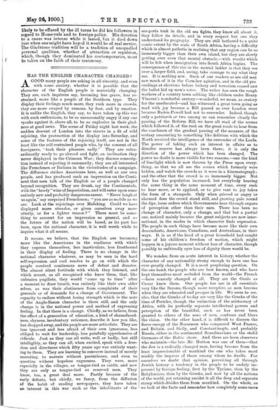THE GLADSTONE TRADITION.
SIR HENRY CAMPBELL-BANNERMAN said no more than the bare truth when he described Mr. Gladstone as having "an undefinable something which seemed to raise him out of the ordinary category." Other men may excel their fellows, but they are still "homo- geneous" with them. Mr. Gladstone was something different in kind. The same thought underlies another variety of praise which has often and most justly been given to Mr. Gladstone. Politics, it has been said, and said with a justice which only journalists and Members of Par- liament can adequately appreciate, have changed their character since Mr. Gladstone retired from public life. Great measures may be introduced, or passed, or with- drawn, and the surprises of Parliamentary history are -always with us. But where is the quiver which seemed to run through the House of Commons when at some critical moment of a debate Mr. Gladstone was seen advancing towards the table ? It has disappeared. There is still speculation as to what Governments intend to do, how they will succeed in extricating themselves from this or that difficulty, and whether they will be lucky enough to turn the tables on a clever opponent. But the feeling is languid by the side of that which was aroused when these same questions were asked about Mr. Gladstone. What concerns us now is simply the result; the process is a matter of indifference. The attempt will be made with rather more or less of ingenuity, but it will have none of that supreme interest which it had when Mr. Gladstone was the actor in it.
- But tame as these praises are, and they might be multiplied almost without limit, there is one feature which is common to them all. They are all personal to Mr. Gladstone. They relate, not to what he did, but to the way in which he did it. When Sir Henry Campbell- Bannerman describes him as being not merely above other men, but not homogeneous with them, he says that he has found this estimate of him among men " of all shades of political opinion." Necessarily, therefore, it is an estimate which relates wholly to the manner in which he did things. It is impossible that Home-rulers and Unionists, or men who loved and men who disliked the Irish Establishment, should be of one mind upon the policy of Mr. Gladstone's measures. On the other hand, they may perfectly be of one mind as to the personal gifts which the conception and handling of those measures disclosed. But the fame which rests on personal gifts is necessarily at its greatest in the lifetime of their possessor. Great beauties leave a kind of evanescent bouquet to the ages that follow, and what Mary Queen of Scots has been to generations of historians, Mr. Gladstone may be to generations of politicians. The tradition of his eye or of his voice may survive those whose gaze has sunk under the one or whose ears have been charmed by the other. But when a future generation comes to ask what Mr. Gladstone has left behind him, with what great cause his name has been associated, what lasting principle of political conduct he has left as a legacy to his suc- cessors, it will be hard for the most convinced Gladstonian to supply an answer. Some, perhaps, will say that his name will be eternally linked with the effort to rescue the Christian population of Turkey from their Mahommedan oppressors. And if you take Mr. Glad- stone in Opposition this is quite true. The Bulgarian campaign of 1876 and the following years drew out all the enthusiasm of which he was capable. It was perfectly sincere, and for the time altogether absorbing. Every moment of his time, every thought of his heart, was given up to that one question. But within four years of the opening of that campaign Mr. Gladstone had reaped the harvest of his exertions, and was at the head of a powerful Administra- tion. What did he do for the deliverance of the Christians in Turkey then ? Just nothing at all. The great Liberal victory of 1880 was largely won by their means, but they did not influence one thought or one act of Mr. Gladstone when he had the power to do something for them. He had an extraordinary faculty of seeing and seizing the good with which the moment was laden. If he was in Opposition, he knew the error of the Government which most laid them open to attack, and as whatever the question might be it became to him while he was possessed by it the only one that had any real importance in the eye either of God or man, he worked that error for all that it was worth. But the business of a Leader of Opposition is to place himself in office, and when this end is gained the means by which it has been obtained lose their interest. Mr. Gladstone's indignation at Lord Beaconsfield's Eastern policy was perfectly genuine, but when that policy had been finally defeated his mind passed on to other things, and so far as we know, the Christians of Turkey were no whit the better for the victory to which they had helped Mr. Gladstone.
It was much the same with Home-rule. Here, indeed, he framed two Bills and carried one through the House of Commons. No one can doubt of the honesty of Mr. Gladstone's belief in the principle to which he was con- verted so late in life, or do other than admire the skill with which he piloted through a House of Commons a measure which many of his own supporters only half liked. But his interest in the question flagged even in the moment of victory, and when the Lords threw out the Bill he allowed his colleagues to postpone the Dissolution which offered the one chance of showing that the country was behind him. The truth is that in political matters Mr. Gladstone was above all things an opportunist But he was an opportunist of a very exceptional type. Ordinarily speaking, opportunists sit lightly by the causes they take up, even while they are most busy in promoting them. They are cynics by nature, only their cynicism is strictly % subordinated to the objects they have in view. Mr. Gladstone had nothing of the cynic about him. For every cause with which he identified himself he worked with all the enthusiasm of conviction. But though this is true of his conduct of questions, it is not equally true of his selection of them.. There was an interval—it might be only of hours—in which he was really the opportunist, reading the political sky with singular accuracy of fore- cast, and seeing precisely the steps which would best advance his purpose. It was in this way that he seized upon the Irish Church, upon the Eastern question, upon Irish land, upon Home-rule. He believed in them with all the fervour of a convert, but there had been, we cannot but think, a moment when their real claim on his attention was the advantages they might yield to an old Parliamentary hand. For though in many aspects Mr. Gladstone was the exact reverse of an intriguer, there was an aspect in which he was proud of his vast acquaintance with Parliamentary life, and his consequent command of Parliamentary strategy.
It is this which will so greatly puzzle the future historian of the latter half of the nineteenth century. He will read of the extraordinary influence exercised by Mr. Gladstone upon all who came in contact with him, and he will find this fact established by a mass of evidence which will leave him no choice but to accept it. There have been politicians who have rescued a political party from something like political extinction, and have made it great and prosperous. There have been politicians who have consistently identified themselves with a single cause, have stood by it alike in victory and in defeat, and have left it as a dying bequest to a generation more fortunate than their own. There have been politicians to whom the nation looks back as the authors of great and beneficent measures which without them might never have been passed. With these the historian has no trouble. He has but to study what they have done, whether the gainer by their action has been a party or a cause or a nation, and when he has mastered this the problem is solved. No historian will be able to apply this process to Mr. Gladstone's career. He has, indeed, been the author of great Budgets, which his extraordinary grasp of financial principles enabled him to carry triumphantly through Parliament. But though, as Free-traders, we owe him a great debt, posterity will probably look further back and see in him the eloqUent disciple of Peel and Cobden rather than the originator of a financial reformation. The memory of his services to the Liberal party, great as they undoubtedly were, seems likely to be effaced by the ill turns he did his followers in regard to Home-rule and to foreign policy. His devotion to a cause was intense while it lasted, but it died down just when one might have hoped it would be of real service. The Gladstone tradition will be a. tradition of unequalled personal qualities, whether of attraction or repulsion, which, though they dominated his contemporaries, must be taken on the faith of their testimony.







































 Previous page
Previous page